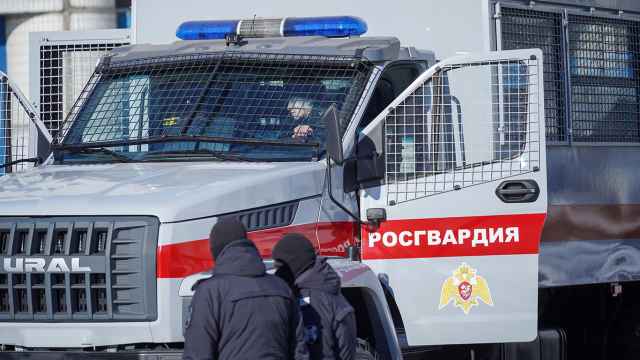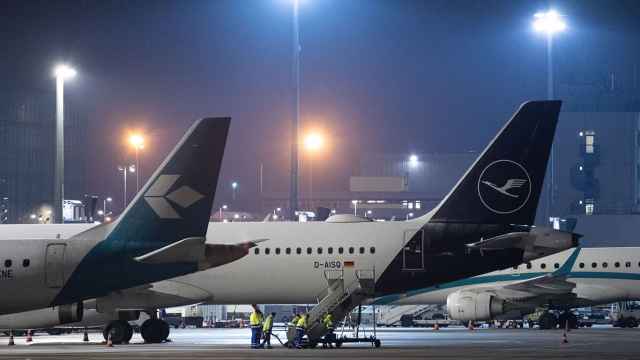When the world's major powers gather in Istanbul on Saturday for crucial talks with Tehran on its nuclear program, Moscow's negotiators will have extra motivation to avoid a war.
An Israeli attack on Iran would not only send shock waves throughout the Gulf region and the Islamic world, it would also have unpredictable consequences on the South Caucasus, long regarded by Moscow as Russia's own backyard.
Some experts are warning that a war with Iran carries the risk of reigniting the conflict over Nagorno-Karabakh, an Azerbaijani breakaway province controlled by Armenian separatists, and even precipitate a war between Russia and Georgia.
While those voices are a clear minority, few dispute that the region, awash with unresolved ethno-territorial conflicts, remains a powder keg. And the ratcheting up of tensions over Iran has already spilled over into Azerbaijan, Armenia and Georgia.
Earlier this week, Iran's Intelligence Ministry that it had arrested an Israeli-backed terrorist group whose headquarters lay in another country in the region.
The ministry did not name the country, but most observers pointed to Azerbaijan. The country has been described as a potential staging ground for an Israeli attack on Iran in a controversial article by the U.S. magazine Foreign Policy last month, which claimed that Baku has granted Israel access to air bases on its territory.
Ali Hasanov, a senior official in Azerbaijan's presidential administration, denied the report, saying "foreign circles" were using the tensions over Iran to sow discord between both countries, Nezavisimaya Gazeta reported.
But Baku has seen a host of suspicious recently. Earlier in March, police arrested 22 individuals whom they accused of being hired by Iran to stage terror attacks against Israeli and American targets.
Those arrests came on the heels of a report in January that Azerbaijan had uncovered an Iranian plot to kill the Israeli ambassador in Baku.
On Thursday, Azerbaijan's National Security Ministry it had arrested a group of more than eight Azeri and Iranian citizens suspected of smuggling arms and drugs into the country.
Deepening ties between Israel and predominantly Muslim Azerbaijan were highlighted in February when it emerged that Baku had bought arms worth $1.6 billion from the Jewish state. Analysts have said the deal has little to do with Iran and a lot with Baku's drive to equip its military for a potential war over Nagorno-Karabakh.
But a shadow of doubt was cast over this explanation by a media last week that said the arms purchase included Gabriel anti-ship missiles, which Azerbaijan will use to protect its Caspian Sea coast from Iranian warships.
Tehran has also Baku of supporting Israeli-trained assassination squads targeting Iranian scientists, an accusation the Azeri government called slander.
And in February, Baku lawmakers called for changing the country's name to "North Azerbaijan," suggesting that the 16 million ethnic Azeris who live to the south in northern Iran are in need of liberation.
All this already makes for a lot of trouble in Iranian-Azeri neighborly ties, but by bringing in Armenia, Georgia, the United States and Russia, the picture becomes more dramatic.
Armenia, the region's staunchest Russian ally, is dependent on supply routes through Georgia and Iran because it has no ties with Azerbaijan and Turkey, its other two neighbors.
Earlier this month an Armenian analyst warned that Azerbaijan might launch an attack on Nagorno-Karabakh because it calculates that Iran would close its border with Armenia and Georgia would not let Russian aid pass through its territory.
"They understand that and can use that in case of a war over Iran, Sarkis Astaryan was quoted as saying by the Panarmenian.net .
Meanwhile, Georgian officials warn of a new war with Russia, citing Moscow's announcement to hold large-scale military exercises in the North Caucasus in September.
Giga Bokeria, the secretary of Tbilisi's national security council, argued that the Caucasus 2012 exercises will include Russian troops stationed in Georgia's breakaway provinces of Abkhazia and South Ossetia.
Speaking on Ekho Moskvy, he that Moscow wants to achieve regime change in Georgia "finishing what it started in 2008," when Russia and Georgia fought a brief war over South Ossetia.
Military analyst Pavel Felgenhauer went further by that the planned exercise is intended to counter any U.S. involvement in a war with Iran.
And Georgian opposition figures have suggested that a series of newly constructed provincial hospitals was financed by the United States and part of a covert campaign to ready the country for war.
Russian Deputy Foreign Minister Grigory Karasin has said the fuss about the exercise was inappropriate.
But analysts told The Moscow Times that risks over Karabakh and in Georgia are so high, that no side would dare fire a shot, lest they set off a devastating war.
"A war over Iran would destabilize the whole South Caucasus," said Alexander Krylov, of the Institute of the World Economy and International Relations.
He argued that Russia's North Caucasus exercises do not mean that war is imminent. Rather, he said, they could "cool the heads of regional leaders and demonstrate stability."
Krylov also strongly argued against the possibility of an Azeri attack on Karabakh, saying it would jeopardize the country's precarious foreign policy position.
"Nobody would support them, not even Turkey," Krylov said.
A former ambassador from a major western country to Azerbaijan, who spoke on condition of anonymity because of the sensitivity of the issue, agreed that Azeri President Ilham Aliyev was a "clever man" who will do everything to maintain a foreign policy strategy of "quadrilateral balance between Russia, Iran, Turkey and the West."
"Right now they are very busy telling the Iranians that they pose no threat to Tehran's security," the ex-ambassador said.
He added that a war between Israel and Iran would only upset this balance.
Others said both Azerbaijan and Armenia would suffer considerably from a war over Iran because it would bring Baku's lucrative oil exports to a halt, while stopping Yerevan's crucial oil imports from Iran.
Ben Judah, a Caucasus expert at the European Council of Foreign Relations think tank said Israel currently imports a third of its oil from Azerbaijan, which flows via pipelines through Georgia to the Black Sea.
"War with Iran would leave Baku vulnerable," he said in a telephone interview from London.
A Message from The Moscow Times:
Dear readers,
We are facing unprecedented challenges. Russia's Prosecutor General's Office has designated The Moscow Times as an "undesirable" organization, criminalizing our work and putting our staff at risk of prosecution. This follows our earlier unjust labeling as a "foreign agent."
These actions are direct attempts to silence independent journalism in Russia. The authorities claim our work "discredits the decisions of the Russian leadership." We see things differently: we strive to provide accurate, unbiased reporting on Russia.
We, the journalists of The Moscow Times, refuse to be silenced. But to continue our work, we need your help.
Your support, no matter how small, makes a world of difference. If you can, please support us monthly starting from just $2. It's quick to set up, and every contribution makes a significant impact.
By supporting The Moscow Times, you're defending open, independent journalism in the face of repression. Thank you for standing with us.
Remind me later.






